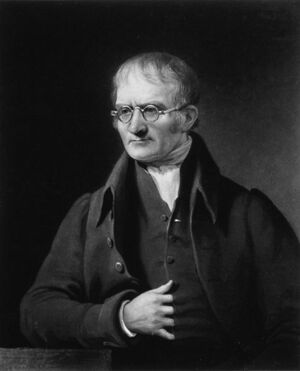John Dalton (nonfiction): Difference between revisions
Jump to navigation
Jump to search
No edit summary |
No edit summary |
||
| Line 1: | Line 1: | ||
[[File:John_Dalton_by_Charles_Turner.jpg|thumb|John Dalton.]]'''John Dalton''' FRS (/ˈdɔːltən/; 6 September 1766 – 27 July 1844) was an English chemist, physicist, and meteorologist. He is best known for proposing the modern atomic theory, and for his research into color blindness, sometimes referred to as Daltonism in his honor. | [[File:John_Dalton_by_Charles_Turner.jpg|thumb|John Dalton.]]'''John Dalton''' FRS (/ˈdɔːltən/; 6 September 1766 – 27 July 1844) was an English chemist, physicist, and meteorologist. He is best known for proposing the modern atomic theory, and for his research into color blindness, sometimes referred to as Daltonism in his honor. | ||
On September 3, 1803, Dalton began using symbols to represent the atoms of different elements. | |||
== In the News == | == In the News == | ||
Latest revision as of 08:08, 10 September 2018
John Dalton FRS (/ˈdɔːltən/; 6 September 1766 – 27 July 1844) was an English chemist, physicist, and meteorologist. He is best known for proposing the modern atomic theory, and for his research into color blindness, sometimes referred to as Daltonism in his honor.
On September 3, 1803, Dalton began using symbols to represent the atoms of different elements.
In the News
Fiction cross-reference
- Crimes against chemical constants
- Crimes against physical constants
- Gnomon algorithm
- Gnomon Chronicles
Nonfiction cross-reference
External links:
- John Dalton @ Wikipedia
